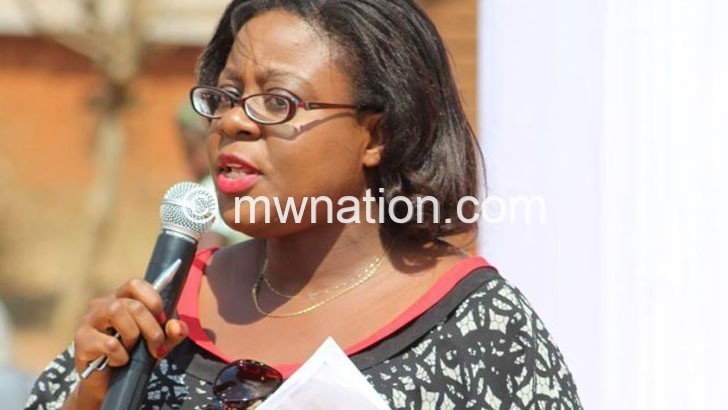Enhancing women participation in politics
Malawi still faces challenges when it comes to women representation in politics.
Since the advent of multiparty democracy 29 years ago, the country has been grappling to field women in both local government and parliamentary elections.

For example, in 1999, women representation in the National Assembly was about nine percent.
In 2004, the representation went up to 15 percent and in the 2009 election, it reached just below 21 percent out of the 193 seats.
Unfortunately, instead of continuing the trajectory, the number of women in Parliament significantly dropped to 16 percent in the 2014 elections.
Much as this remains a concern in all the districts across the country, the situation is worse in Neno, Salima and Karonga districts.
Statistics in the three districts show that the representation of parliamentary seats won by women in the 2019 Tripartite Elections was the lowest as compared to other districts.
Overall, there has been under-representation of women in positions of leadership and decision-making in many of the country’s key institutions.
Due to patriarchal norms, inadequate knowledge and skills on women and young women vying for political seats; among others, the Malawian society has not supported women vying for leadership positions.
This has forced the women to shy away from positions of influence such as politics and other leadership positions, thereby, contributing to dismal representation in political positions.
However, globally, there has been a discourse and agenda promoting women participation in decision-making positions.
Beijing Platform for Action, from 4th World Conference on Women, Beijing 1995, prioritised and backed women’s leadership. It advocates for women’s equal access to and full participation in power structures and decision-making.
It also emphasises the need to increase women’s capacity to participate in decision-making and leadership.
Not only that, the 2030 Agenda for Sustainable Development Goals (SDGs) underscores the need to achieve gender parity in leadership through SDG target 5.5 that necessities “women’s full and effective participation and equal opportunities for leadership at all levels of decision-making in political, economic and public life”.
The Convention on the Elimination of Discrimination Against Women (Cedaw) explicitly mentions women’s political equality (articles 7-9) and discusses women’s equal participation at all levels (Article 7b).
And locally, the Gender Equality Act of 2014 aims at promoting gender equality, equal integration, influence, empowerment, dignity and opportunities, for men and women in all functions of society.
It is against this background that the National Initiative for Civic Education (Nice) Public Trust embarked on a one-year Nthawi Yawo Project to change the narrative in Salima, Neno and Karonga districts.
The project, which seeks to increase the number of women in the 2025 Tripartite Elections in Salima, Neno and Karonga districts, is being funded by the United Nations Development Programme (UNDP).
Nice Trust is implementing the project in collaboration with Centre for Civil Society Strengthening (CCSS).
Speaking last Wednesday in Lilongwe during the orientation workshop of the project, Nice Trust Board chairperson Lingalireni Mihowa touted the project, saying it will enhance the participation of women and young women in elections and politics in general.
“This project seeks inclusive participation of women in Malawi politics. It is meant to empower women and young women,” she said.
Among others, Mihowa said the project will empower women to participate meaningfully in politics, enhance effective influence on political and decision-making position processes, develop training manuals for female aspirants, support aspirants with coaching and mentorship sessions.
The project will also engage the female aspirants in public awareness forums, recruit male champions and gatekeepers to ensure total support of the campaign, support road-shows, engage artists to canvass their support, and many more interventions.
“Our aim is to move around the lengths and breadths of the three districts to meet all relevant stakeholders that can help us to break the barriers that impinge women and young from participating in politics,” said Mihowa.
She said the situation in the three districts requires serious soul-searching.
On her part, Ministry of Local Government, National Unity and Culture Principal Secretary Elizabeth Chindebvu, who presided over the workshop, expressed happiness with the project, saying it will concretize the provisions of Gender Equality Act.
“The Act, which has been in place since 2014, calls for 40/60 representation in all government leadership positions in Malawi. We have been lacking stakeholders to drive the message home,” she said.
Chindebvu, therefore, reiterated government’s commitment to support all efforts under this project to ensure that it achieves its intended expectations.
UNDP Malawi chief technical adviser of elections, Isaack Otieno said their interest is to see more women and young women taking part in politics to fill the current gaps both at the local and parliamentary elections.
The district gender officers from the three districts, hailed Nice and CCSS for the project, saying it will break down the cultural norms, stereotypes and other negative perceptions that enforce the view that women and young women cannot be leaders and should remain on the side-lines.






One Comment